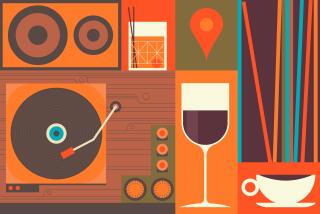Underground No More
- Share via
Back in the day, you may have needed to know someone in the know to find world music. Someone to shuttle you to that backyard Brazilian party or the tiny sandwich shop where they spin soca and zouk and have ginger beer. That you should bring a blanket and warm clothes to hear ragas on a lawn.
Now, though, the throwaway line--”There’s nothing to do in L.A.”--has never been so wrong.
Much of the world music scene had been underground, recalls Nnamdi Moweta, host of “Radio Afrodicia” on KPFK-FM (90.7), who landed in Los Angeles from Nigeria via San Francisco in the ‘80s. He found a smattering of clubs like the Music Machine; C.C. Smith and Solomon Egbuho (known on-air as Solomon Solo) had “The African Beat”; and Mario Casetta, KPFK public radio guru, was winding listeners through Eastern Europe or Tuva, depending on the day.
“There were [African] juju and hi-life bands playing here. But in those days, you could barely find Miriam Makeba or Hugh Masekela records in the store,” he says.
Moweta has been tooling around the international music scene since before it had a name. If you went then to record stores to find it, you might have found a few dusty odds and ends in the “international” bins at some of your better (read: idiosyncratic) purveyors.
“It was a product placement thing,” Tom Schnabel, host of “Cafe LA” on KCRW-FM (89.9), says of trying to find the music in record stores. “If it wasn’t a field recording, found sound, source music or ethnomusicology, people didn’t know where to put it. The term ‘world music’ emerged as a marketing category. And we’ve been trying to get rid of it ever since.”
As public and college radio offered more enticements, curiosity grew. The music--from far locations embroidering the story of a country’s politics or history or its expressions of love--provided a diversion in the late ‘70s and the ‘80s.
“Punk was over. Bob Marley had died,” says Schnabel.
The antidote to Yes and Journey? King Sunny Ade at the Palladium. Five thousand people. “It really kicked in after the ’84 Olympic Arts Festival, where we had groups from all over the world and saw that there really was audience--that this stuff has grown,” Schnabel recalls.
“Overall, people do travel more now, and consequently they’ve become exposed to more ... food, coffee, music.” And what does that mean for world music? As Schnabel puts it: “There is an appetite again.”
More to Read
The biggest entertainment stories
Get our big stories about Hollywood, film, television, music, arts, culture and more right in your inbox as soon as they publish.
You may occasionally receive promotional content from the Los Angeles Times.










